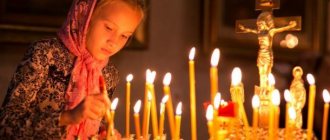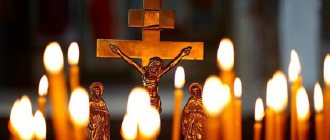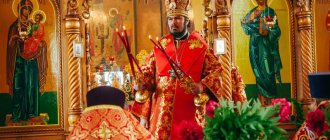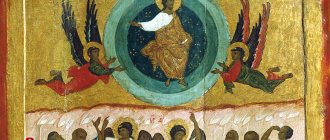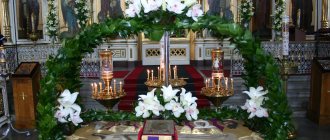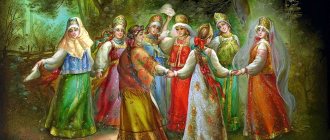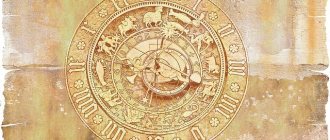There are a lot of holidays in the Orthodox church calendar, which people are well aware of, who regularly attend church and have a special attitude towards faith. Many of these holidays are somehow “tied” to one of the most significant celebrations - Easter. An example of this is Radonitsa, which will be discussed.
This holiday exists in the tradition of the Eastern Slavs; it is the first day of remembrance of the dead after Easter. The combination of the name of the holiday (the word “joy” is clearly visible in it) and sadness about those who are no longer with us will seem strange to the average person. However, Radonitsa has deep spiritual significance. What is the history of the holiday?
Why are there no funerals held on the Feast of the Resurrection?
Orthodox traditions have been carefully preserved for centuries, but certain periods of history made their own adjustments. In the years when most churches were closed, people gathered at the cemetery on church holidays. Bright, joyful emotions associated with the Resurrection of Christ and the granting of hope for eternal life were mixed with sadness for deceased relatives. The tradition of celebrating the Resurrection near the graves of the dead is disappearing; everyone can now visit the church for the festive service. The Church Charter prohibits going to the graves of relatives on Sunday; they celebrate a great event in the life of believers in the Temple. People gather with families around a rich table with traditional dishes, enjoy life, delicious meals, and communication. When reading the Liturgy, the priests do not conduct Easter commemoration of the dead, but at the request of parishioners they can conduct a short litany for them.
Prayer for the departed on Parents' Saturday
On parenting days, every Christian is supposed to attend a church service and pray for the souls of the dead, including their close relatives. If for some reason it is impossible to visit the temple on such a day, clergy recommend reading prayers at home.
If a person is not a deeply religious person and does not know how to properly commemorate the dead, you can turn to the ministers of the nearest parish for help. It's best to do this in advance. They will tell you what prayers to read on this day. You can find the literal text in the prayer book.
Parental Saturdays in the Orthodox calendar: 7 holidays of remembrance
Despite the fact that all Christians celebrate parental days, there are noticeable differences between faiths. In Orthodoxy there are seven such days.
How to hold a wake for the deceased on Easter holidays
It is impossible to predict the minute of death; many people die during Bright Week. If a person reposed on the days of the holiday, the funeral service is held on Easter, but according to a special Easter rite. In the prayers of the priest for the deceased, according to the rules of the Trebnik, there will be little of the usual funeral singing. The funeral service includes many festive songs, which talk about the greatness of Christ, his victory over death, and the hope of eternal life.
It is not recommended to remember deceased relatives on Easter, Easter Sunday. If the death of one of your relatives falls on a holiday this year, it is worth ordering a memorial service on the anniversary before the desired date. According to the Church Charter, the ninth and fortieth day of presentation of the deceased is postponed. But relatives can pray in church or at home for peace of mind, not forgetting that Christ has given hope for eternal life and a meeting with the dead. Funeral Easter passes with thoughts of a divine miracle. Are there funeral services during Easter week? According to all church rules, the Week is intended for joy and rejoicing; it is worth celebrating with pleasant thoughts, at a service in the temple. When it is necessary to commemorate a deceased person whose anniversary of death and memory falls on such a week, it is worth organizing the commemoration earlier or waiting until Radonitsa arrives.
Radonitsa - a common holiday with the departed
What kind of day is this - Radonitsa - the first commemoration of the dead after Easter? Why is this holiday called that? How to properly remember your dead on Radonitsa and other days? What superstitions and misconceptions exist related to the memory of the dead?
Day of common joy
Beginning with Holy Week, which is dedicated to the remembrance of the last days of the earthly life of Christ the Savior, on the holiday of Easter and Bright Week, the Church does not perform a memorial service for the departed or another public prayer for them during services. Why? Because this is first a time of church-wide grief over the suffering and death on the cross of Christ the Savior, and then, accordingly, a time of great triumph and joy. And accordingly, funeral proclamations during this period are inappropriate.
But it cannot be said that at some time the Church leaves without prayer and without commemoration its children, either among the living or among the deceased. At any full Liturgy - that is, on Maundy Thursday, on Holy Saturday, at the Easter service itself and throughout Bright Week - the living and deceased are commemorated at the proskomedia, when the priest takes out particles from the prosphora and reads the corresponding prayers, and only after the transformation of wine and bread into the Blood and Body of Christ is accomplished, these particles are poured into the chalice and everyone is remembered again.
And Tuesday next after Bright Week is the first day when the deceased are commemorated in a public manner, when after the Liturgy a memorial service is also performed. And this day becomes a day of common joy - ours and that of our deceased loved ones, because while we perform funeral prayers for them, at the same time we call on them to share with us the joy that we enjoy during this Easter period. And the word “Radonitsa” and the word “joy” have the same root.
In the Kiev-Pechersk Patericon there is an episode when one of the fathers comes to the tomb where the deceased venerable fathers of the Kiev-Pechersk are buried, and exclaims there “Christ is Risen!” and hears the answer: “Truly he is risen!” This is just such an image of how the joy of the Risen Christ is shared by those who have died and those who are now living.
At the cemetery on Easter?
Our compatriots know quite widely about Radonitsa as a special day of remembrance of the dead, and in some regions of Russia this day is a day off. Moreover, often regional authorities annually oblige the relevant services to organize additional routes or public transport flights to cemeteries. But despite all this, many Russians have a firmly rooted tradition of going to churchyards on the feast of the Resurrection of Christ.
Practice shows that those who have not been to church and did not celebrate this greatest celebration go to the cemetery on Easter. In fact, they experience a kind of substitution when, instead of going to the temple, they go to the cemetery. I think that in many ways this tradition, to a large extent, arose in Soviet times, when people were deprived of the Church - deprived not because they could not get there at all, but because they were somehow artificially torn away from it . There were few churches, and it was scary to go to them, so we lost the habit. But the soul demanded something like this, some kind of unity with the spiritual world on this very day - on the basis of some historical, religious memory, which was not fully realized by the person himself. And so people flocked to the cemetery. Today, of course, we must try to get rid of this tradition. It’s better to be in church on Easter, and go to the cemetery on Radonitsa.
On the other hand, if we assume that this is a monastery cemetery or a cemetery at a church, then, probably, nothing prevents you from going to one of the graves on Easter Day or any other day and singing the Easter troparion there or greeting the deceased in the same way the very proclamation “Christ is risen!” But it is, of course, not worth taking this path on purpose, much less putting the graves in order at this time.
There are many superstitions associated with church holidays, traditions and prohibitions. One of these: on Easter, you cannot go to the cemetery, because the deceased are at this celebration together with the risen Savior, and thus, by visiting them at the cemetery, we seem to pull them out of this celebration. Of course, we can’t pull anyone out of nowhere, no matter how hard we try. We can only imagine very roughly where our deceased are, because any knowledge we have here on earth about the spiritual world is very, very relative. And if the Lord gathers someone somewhere for some celebration, then, obviously, those gathered by Him will remain there. And when we pray for our deceased, we only bring certain joy or relief to their soul. And if they themselves have achieved not only salvation by the grace of God, but also some kind of special honor with God, then by praying for them, we, in turn, are granted prayer help from them.
Death at Easter
What if, for example, on these days, when the Church publicly does not commemorate the dead, you need to bury a person and arrange a wake? Naturally, the rite of burial, or, as it is usually called, funeral service, is performed on these days. However, it has its own specific statutory features and is of an Easter-joyful nature. There have been cases when one of our parishioners had the opportunity to perform a funeral service on Bright Week - an amazing feeling from this burial on Bright Week...
There is a church tradition that believes that someone who has passed on to another life on Easter is a person who has been honored with the special mercy of God. But it still seems to me that any explanation of this kind must be consistent with some other circumstances, because many people die on Easter, and among them there are not only pious ones. It’s one thing when a Christian dies on the day of the Resurrection of Christ, who tried to live according to the Gospel, strove for God, repented, fought, we can see in this some special mercy of God. But it’s another matter when an open atheist, a blasphemer of the name of Christ, dies on this day... This cannot be automatically extended to everyone.
I have also heard the belief that those who die on Easter, or on Bright Week, appear before God's judgment without ordeal. In my opinion, it’s not even worth discussing this topic. Firstly, we know about the ordeals, in particular, from the vision of Blessed Theodora and, in part, perhaps, from what was revealed at one time to St. Anthony the Great. But all visions of this kind, which were holy, had, as theologians call it, a certain pedagogical character, that is, we were shown, in forms and images accessible to us, the reality of another world. And it was shown how a person could contain it and convey it to other people. We cannot say that this is how a person travels this path. Does he go through the ordeals as certain stations, as depicted by Blessed Theodora, or does he go through them as described by St. Anthony the Great, who saw a certain giant dragging people down at different levels. In general, we can probably say that in ordeals a person encounters certain obstacles that even in earthly life hindered him on the path to God and to heavenly ascent.
Secondly, the day, date, moment of our death does not depend on us; we cannot order our own death on Easter. But something completely different depends on us: how much we can avoid sinning and bring repentance to God for what we have already sinned.
Attempts to determine, on the basis of external factors, whether the deceased has been honored with God’s mercy have exactly the same idle character. If we know how this person lived and see in his life some reason to hope for the mercy of God and salvation for him, or we notice that his loved ones become more zealous, more zealous in their Christian life, this indirectly somehow testifies to God’s mercy towards him. Again, what is the principle here? If we have the strength to be here some kind of intercessors for him, to strive for this person, then we can be sure that to some extent the Lord is moving us towards this, Who Himself wants to show mercy, and in us, as it were, is looking for a reason for this .
This idea that the Lord, as it were, is looking for a reason to show His mercy to man, is found in two authors who lived at different times and never read each other: St. Theophan the Recluse and the Athonite elder Joseph the Hesychast. And they talk about it in approximately the same words: God is looking for a reason to have mercy on a person. In what sense should these words be understood? That is, God is looking for a reason not to condemn, but to have mercy - this is the direction of God’s will in relation to man. I’ll make a reservation: of course, this expression, “God is looking for a reason,” is conditional. Everything we say about God is extremely imperfect. As St. Isaac the Syrian said, words are the tools of this age, and silence is the sacrament of the future age.
All-Church Commemoration
Why does the Church establish special commemoration of the dead, including with a special rite called parastas, several times a year? The Holy Fathers have this comparison: private prayer is a boat on which a person sits and rows alone, but church prayer is a ship on which there are sails and many rowers. Each of us must remember our own deceased ones, must pray for them, but nevertheless it is necessary that throughout the year there be several such services during which almost the entire Church prays. And, on the one hand, for us this is a kind of school of prayer, a reminder of prayer, and at the same time an opportunity to fulfill our Christian duty of love. That is, at this moment the entire Church, represented by its living members, gathers to pray for all those members of the Church who have already died. This is the meaning of parastas.
There is a misconception that on days of special remembrance of the dead, the Church also prays for those people who independently passed away, that is, for suicides. Of course, this is not true: there are simply no days when the Church would pray for the lives of those who died without permission.
Where this belief came from and what its basis is is very easy to understand. There is probably no more terrible grief than when someone close to you passes away in this way. And I want to find consolation in prayer for such a person and I really want to come up with some reason in connection with which this prayer would still be allowed in the Church. But there is no such reason. You can't even light a candle for them.
But there are two points here. If we are talking about a person who was mentally ill, and this is confirmed by relevant medical documents, then he may not be charged with what he did, since people with certain diagnoses can commit suicide in a state of insanity, or paralyzed illness of the will, when not strength to resist either the action of dark forces, or any kind of stress, or a state of depression. In such cases, the question of the possibility of a person’s funeral service is submitted to a special diocesan commission for consideration.
For relatives and loved ones of those who committed suicide not due to mental illness, we can offer the prayer of St. Leo of Optina, which he gave to one of his students, who greatly grieved for his father, who had committed suicide. It contains some consolation for the reader and, of course, will be some kind of consolation for those who have passed away in such a terrible way. But it’s better not to start reading this prayer yourself, but to come to the temple and take a blessing from the priest.
In addition, I can advise giving alms in memory of a person, doing some good deeds - precisely for his sake. Of course, we should not ask those to whom we do good to pray for him and not bring temptation upon them in this way, because it has been noticed that something very difficult and terrible happens to people who, contrary to church regulations, pray for suicide. Firstly, because they take upon themselves beyond the measure of a person, and secondly, because in this there is a certain pride and desire to be kinder than the Church, more merciful than the Church. And this cannot end well.
The Venerable Elder Paisios of Athos spoke about one man who was unjustifiably, innocently detained for something - this was most likely during the war - he was tortured for a long time, and he, being under the influence of fear and horror of new torment, seized the moment, when he was being transferred somewhere, he threw himself off a cliff. They treated him like a suicide: they didn’t perform a funeral service, and they didn’t bury him in the church cemetery. But Elder Paisios says that, of course, none of us knows what his fate is and, perhaps, the Lord will be merciful to his soul and will not impute to him this sin committed out of fear. And then he gives a completely unexpected explanation for the seemingly cruelty of the Church, which in this case does not perform commemoration: when a person is tempted by the thought of leaving life, there is something that still holds him back. And just one of these deterrent factors is the idea that this is a terrible sin and that the Church will not remember. And if we soften our attitude towards this, then for a huge number of people we ourselves will open this door, which will not be mercy, but cruelty.
Unfortunately, even many people perceive the Church’s refusal to commemorate suicides as rejection, as if we had put the seal of death on a person. But the Church cannot do anything that is simply a sign of rejection. Just like excommunication from the Church is not carried out in order to punish a person and destroy him - but to force him to come to his senses and return, to repent. This apparent cruelty is actually a matter of mercy towards those living and tempted by the thought of suicide, and, to some extent, towards those who have passed away from this life, because they receive some kind of punishment, but at in this they can be worthy of God’s mercy, because God’s judgment is not known about anyone.
About those who died outside the Church?
Today, the clergy does not have a common opinion regarding the funeral and funeral commemoration of those people who were not churched. Some believe that since people made such a choice during their lifetime, that is, they themselves abandoned God, then we have no right to violate this will. Others say that a person could have been mistaken, and now that he has already appeared before God and cannot help himself, our duty is to help him. Personally, I much prefer the second opinion. But I do not dare to rely solely on some of my own experience or views, which may also be erroneous. I rely on the same rites of remembrance of the dead that we have in the Church. We honor the canons that are heard in churches on the days of remembrance of the dead, let us listen to the chants that are sung. And we will understand that we are talking not only about those who lived a pious life, not only about those about whom we have no doubts, but also about everyone who, one way or another, died by their own death and was baptized .
Yes, indeed, in priestly practice there are cases when it was not possible to sing at the funeral service “With the saints, O Lord, rest the soul of your departed servant,” or to pronounce a commemoration in the cemetery for all those buried. Then the person began to stutter, stammer, or his beautiful trained voice refused him, and the singers also could not pick up - and as a result, such a prayer was never said. But nevertheless, we usually commemorate all deceased Orthodox Christians in the Church. Naturally, we cannot know what God’s judgment is about this or that person, but how much evidence we have in history, in the Tradition of the Church, that a person who lived a bad life and has already left the Church, through the prayers of his relatives, sometimes some holy men or wives were honored with the mercy of God.
There is such a humorous expression “to be holier than the Pope.” There is no need to try to be overly strict and determine who was saved, who was not saved, who was worthy of God’s mercy and who was not, because it is not for us to judge this. A man died, he was baptized, we have no evidence that he joined a sect, went to some other religion, or deviated into heresy, or was an obvious atheist, cursing God and the Church all his life, out of love for him - You can remember him.
Of course, if we know that a person was involved in some kind of dark activity in his life, for example, he was a sorcerer, then there is no point in remembering him - there is no need to take on such a terrible cross. If a person was some kind of notorious villain, scoundrel, murderer, then you need to look at your specific strengths. Are you ready to take on this cross? Because even if you write a note, you will somehow take this cross upon yourself. The remarkable Athonite ascetic, Hieroschemamonk Ephraim Katunaksky, who literally lived the Liturgy, performed it every day for many, many years, decades, spoke about his experience of praying for his brother - a sorcerer and warlock. Each time, for this prayer, the elder received, as he put it, a slap on the head or a slap on the head, and he realized that he could not do this. When his brother died and naturally stopped practicing magic, Hieroschemamonk Ephraim slowly began to remember him again and felt that he could already do it. There is such an experience, and perhaps it would also be worth looking back at.
How to pray and what to order in Church?
So, what should a Christian know about the remembrance of the dead? First of all, the funeral prayer is his Christian duty, the duty of his love. After all, they themselves cannot change anything in their lives, but our prayer can change something in their current afterlife and their fate in eternity, until the moment of the Last Judgment. How and to what extent, we do not know, but as a matter of love for them, we pray for them.
You also need to know about the types of this funeral prayer. First of all and most importantly, this is commemoration during the proskomedia and the Divine Liturgy. This could be a note submitted before a specific Liturgy, or a “sorokoust” - that is, a commemoration at forty proskomedia and liturgies. This could be a six-month similar commemoration, an annual one, in some cases it could even be an indefinite one, if such a thing is performed in the temple. Another type of funeral commemoration is a memorial service, which is performed almost every day in our churches. To do this, you also need to come to the temple, submit a note with the name of the deceased, and the priest performing the requiem or litia will pray for him. Of course, it’s best that we don’t just bring notes and leave, as if this matter doesn’t concern us, but take part in these services: stand at the Liturgy, at the memorial service, and pray together with the priest for loved ones.
Funeral litia - a short funeral prayer - as a rule, it is performed in cemeteries or during Lent, on weekdays.
A good way to remember the dead is also the Psalter, which a person can read at home. Some monasteries also accept notes for commemoration of the Psalter, which is read for the living and the deceased.
We can also read the canon about the deceased for our loved ones - it is in many prayer books, and you can find it on the Internet. And finally, the so-called akathist about the one who died. This akathist is read not about different people, but about one person; as a rule, it is read forty days after death, and there is a tradition of reading it forty days before the anniversary of the person’s death. But in principle, probably, nothing prohibits reading it at some other time. This akathist is very deep, touching, touching, and it is, of course, a great consolation for those who mourn the departed, as well as for the departed themselves.
In addition to this, of course, you need to know that when a person dies, the canon on the outcome of the soul must be read; if this person suffers for a long time and the soul cannot be separated from the body, there is also a canon that is read about the person who has suffered for a long time. It is ideal when a priest can do this, but if it is impossible to invite a priest at this moment, then family and friends can do it. There are special Sequences that must be read immediately after the death of a person. They include the canon on the exodus of the soul and the Psalter on repose, which are read one after another.
And, of course, you need to know that the Lord first of all hears and accepts not prayer as a form where one thing follows another, and all the words stand in their places, but the prayer that comes from our heart. Therefore, in addition to the established prayer rites, we can pray in our own words, about the simplest things: we can ask the Lord to forgive our deceased relative or friend all his sins that he committed here on earth, voluntary and involuntary, and to grant His mercy and His Heavenly Kingdoms. You can pray about this in your own words, anywhere, at any time, and I always advise people who have just experienced the loss of a loved one to make sure to pray this prayer as often as possible. How often? But every time they remember the deceased, every time their hearts clench with pain, they must say these words. And again, the soul is comforted and calmed down, and most importantly, the soul of the one who has already passed away is comforted and calmed down.
When does the Church recommend commemorating the dead?
The Week, which is called Bright Week, is filled with an atmosphere of joy and jubilation; it is intended for special prayers, communication with family, and fulfillment of holiday traditions. These are the days of remembrance of the great feat of the Son of God. But when do Orthodox Christians remember the dead after Easter? The Church does not forget about the importance of memorial prayers, highlighting Parental Saturdays and other days in the calendar for visiting deceased relatives. One of these days is Radonitsa after Easter for the departed. This is Tuesday of the Week after the Resurrection, it is intended for visiting the cemetery, for performing funeral prayers, and memorial services. On such a day you cannot go to the burial place of your parents or other relatives just for the sake of eating and drinking alcohol; this is an insult to the memory of the dead. Parents' Saturday or commemoration of the dead on Easter is a mental return to those days when the deceased were nearby, giving warmth and support. Commemoration has nothing to do with feasting and alcohol.
According to the traditions of Orthodoxy, when visiting the graves of parents or other loved ones of the deceased, you can bring with you colored eggs, Easter cake, and flowers. It is worth spending time in prayers for peace of mind, memories, bright thoughts about those who have left this world.
What is customary to do on Parents' Saturday?
On Mother's Day, important religious ceremonies are held in churches. Every believer should pray for the dead at church liturgy. Parishioners submit notes for the repose of their deceased relatives to the temple servants. All names listed will be mentioned during the service.
After the service, most families head to the cemetery. Parents' Saturdays are best suited for caring for the burial places of loved ones. Garbage is removed from the grave sites, the monument is wiped down, and the fences are coated with fresh paint. Many people lay fresh flowers on the grave. There is also a belief that on Parents' Day, treats should be brought to the deceased. However, Church ministers say that it is better to bring food to the temple and give it to those in need, since it does not bring any benefit to the deceased.
Cemeteries of St. Petersburg
detailed information
Calling a ritual agent
city funeral service
What to do
when a loved one died
When visiting a cemetery, it is important to remember that cleaning the area is not a priority. It is much more important to spend time remembering the deceased and offering prayers for his soul.
After a trip to the cemetery, many families get together and hold a memorial service. Reminiscing about those who have passed on and remembering the most meaningful moments of loved ones is the best way to preserve a family legacy. Often a wake is accompanied by a stormy feast. However, it should be remembered that Orthodoxy does not approve of gluttony and alcohol abuse, especially on Orthodox holidays.
What the Church warns about
Easter week is the period when Orthodox Christians celebrate the resurrection of Christ and rejoice in the miracle of eternal life given by God. On holidays, priests and Orthodox Christians glorify the son of God, remember the sacrifice he made for the sake of people; the funeral service for Easter takes place after the evening service, it is accompanied by Easter chants. What can be done according to the canons? You should pray with joyful thoughts and mood. This is a time for pleasant events, meetings, visits, a delicious feast at the end of Lent. Such an atmosphere is not compatible with sadness and longing for the departed; there is another time for remembrance. If the date of death falls on a holiday this year, you are allowed to say prayers for the deceased at home and submit a note to the priest asking him to remember the deceased at the litany after the Liturgy. And the trip to the grave and the funeral meal must be postponed until Radonitsa.
Parents' Saturdays in 2020-2021
| 2020 | 2021 | ||
| Meat Saturday | 22.02.20 | 08.03.21 | |
| Parental Saturdays of Great Lent | Second week | 14.03.20 | 27.03.21 |
| III week | 21.03.20 | 03.04.21 | |
| IV week | 28.03.20 | 10.04.21 | |
| Radonitsa | 28.04.20 | 11.05.21 | |
| Trinity Saturday | 06.06.20 | 19.06.21 | |
| Dimitrievskaya Saturday | 07.11.20 | 06.11.21 |
Rules regarding funerals
According to the Church Charter, memorials for the deceased are not held on Holy Week, and the first Tuesday after Easter week is intended for the first visit to the cemetery after the Easter holidays. When the time comes for commemorating deceased relatives, you should not focus on eating at the table. The deceased do not need a feast or drinking alcohol; relatives and friends should pray for the souls of the deceased. When visiting a cemetery, you need to do the following - remove the grave, remember the one who can no longer be there. You can read a memorial service for the laity to read or invite a priest to serve the litiya. Before going to the grave, a note with the name of the deceased is left in the temple. The funeral meal does not take place on the territory of the cemetery; you can celebrate the date at home or in a special institution. You can invite relatives, friends, neighbors who knew the deceased to a meal for the deceased.
Radonitsa is not the only day for remembrance and honoring the memory; there is also Saturday, which is called Parental Saturday. Parental ones are set several times a year, on different dates. In church and at home, you can say words of prayer for the soul of a deceased person.
History of Radonitsa
Like many other holidays of the Christian calendar, Radonitsa has pagan roots. In the distant past, this day was not an official church celebration, but belonged to the pre-Christian festivities of the Eastern Slavs.
Ancient tribes living on the territory of Rus' revered a variety of deities and believed that after death a person’s soul goes to the afterlife. Many Slavic peoples spoke about Iria, a wonderful land where the deceased found peace and joy. At the same time, the deceased ancestors had enormous powers. They became patrons of the clan, could control natural phenomena, and protected their loved ones.
Radonitsa – day of veneration of ancestors / nepsite.ru
The advent of Christianity made significant changes to the beliefs of the Slavs, but could not change them. Radonitsa, the ancient holiday of remembrance of the dead, remained among the celebrations of the people. However, it was now associated with Easter. Interestingly, the name of the holiday also indicates such a relationship.
The word “Radonitsa” (sometimes called rainbow) comes from “joy,” and this is no coincidence. For nine days after Easter, according to Orthodox tradition, the whole world celebrates the miraculous resurrection of Christ.
In the works of St. Athanasius Sakharov it is stated that during Bright Week it is impossible to carry out rites of remembrance of the dead. The first day of “communication” with ancestors who have passed on to another world is the second Tuesday after Easter.
The works of John Chrysostom note that already in the 3rd century in Rus' there was a commemoration of the dead in the spring, and the spread of Christianity did not affect the established traditions.
Slavic rituals on Radonitsa
If a person was cremated, should he not be commemorated?
No, you can. Commemoration of the dead does not depend on the method of burial. However, the Church still considers an ordinary burial to be the norm, since it treats the body of the deceased with reverence. It is usually believed that in Christianity there is a disdainful attitude towards the human body - as a shell, “leather garments” that a person will throw off after death, like unnecessary old clothes. But it is not so.
The fact is that the Church believes in the bodily resurrection. On Good Friday - during Holy Week - Ezekiel's prophecy was read about how this resurrection would happen. Here is an excerpt from there:
“...And he said to me: Son of man! will these bones live? I said: Lord God! You know it. And he said to me: prophesy on these bones and say to them: “The bones are dry! listen to the word of the Lord!” Thus says the Lord God to these bones: Behold, I will put breath into you, and you will live. And I will cover you with sinews, and I will grow flesh on you, and I will cover you with skin, and I will bring breath into you, and you will live, and you will know that I am the Lord. I prophesied as I was commanded; and when I prophesied, there was a noise, and behold a movement, and bones began to come together, bone to bone. And I saw: and behold, sinews were on them, and flesh grew, and skin covered them from above, but there was no spirit in them. (...) And I prophesied as He commanded me, and the spirit entered into them, and they lived, and stood on their feet - a very, very great army” (Ezek. 37: 3-8, 10).
The Church’s attitude towards cremation can be summed up in two sentences - the church document “On the Christian Burial of the Dead” says this:
“The Church believes that the Lord has the power to resurrect any body and from any element (Rev. 20:13). “We fear no harm in any method of burial, but adhere to the old and better custom of interring the body,” wrote the early Christian author Marcus Minucius Felix.”
Therefore, even with this method of burial, a funeral service is performed, and you can pray for the deceased in the usual manner in church and at home.
Meat-Eating Parent's Saturday
The first Parent's Saturday is Meat Saturday. This day of remembrance is considered one of the Ecumenical Days, and is celebrated a week before the start of Lent. It got its name from the Orthodox holiday of Meat Empty, which takes place the next day.
Meat-free Saturday plays a special role for all Christians. First of all, because it is the first day of remembrance of the year. This holiday is also important because of its territorial scope: Meatless Saturday is celebrated by representatives of various Christian denominations all over the world. On this day, mass services are held.
So, if a person died on the eve of Easter, a funeral service cannot be held for him for a week?
No, you can.
It would seem, indeed, is it really necessary to pretend to be joyful just because all Christians rejoice, while we have personal grief? Can grief wait?
On Bright Week they bury and perform a funeral service, but with a special rite, which is strikingly different from the usual funeral service. The sacrament begins with the singing of the Easter troparion: “Christ is risen from the dead, / trampling down death by death / and giving life to those in the tombs.” Also sung are the stichera of Easter, the Easter canon, the usual “Lord, have mercy” at the litany - sung in a festive chant, the Easter greeting sounds: “Christ is risen!” - “Truly he is risen!” etc. Such a special rite of funeral service - joyful - is performed on Bright Week, as it is said in the Trebnik, “for the greatness and honor of the bright holiday of the Resurrection: joy and joy, and not lamentation, is a holiday.”
On Bright Week, for example, in 1993, a funeral service was held in the Optina Hermitage for the monks killed on Easter - Hieromonk Vasily, Monk Ferapont and Monk Trofim. This is how Nina Pavlova, the author of the book about the murdered Optina monks “Red Easter”, recalls it:
“At the funeral, the temple was overcrowded, and people, their eyes blinded by tears, went to bid farewell to their brothers with a final kiss. According to monastic custom, their faces were covered with black cloth. Earthly sorrow filled the heart, but the soul already felt the breath of holiness. On Easter days, the funeral service was festive - they sang Easter. And just like on Easter, the sun shone again and there was a feeling of Easter joy.”
Powerful Prayers
Just as the Body of Christ is one, so are all Orthodox Christians one. Joint prayer is one of the ways to express this unity and receive support. Through prayer, you can ask for mercy for the soul of the newly deceased and receive consolation in grief and despair. Both personal petitions from relatives and prayer in church are important.
In the Orthodox Church
Priests remember the names of the deceased at funeral services, but Orthodox Christians themselves also atone for the sins of their deceased relatives. To perform the ceremony you need to buy a candle from the church. It is placed on the eve table (it stands next to the crucifix). When lighting a candle, you need to ask the Lord to give peace to the souls of the departed, read the “Our Father,” cross yourself three times and bow to the crucifix. You can also read prayers from the Prayer Book, for example, “Psalm 90.”
At home
To commemorate the deceased, it is imperative to read church prayers at home; just say the short form:
“Rest, O Lord, the soul of Your departed servant (name).”
It is important to know a person's baptized name, since by receiving it, he has become part of the Orthodox Church. Daily reading for 40 days is required, but there is no strict limit. Whenever the need arises, you can say a short prayer. There is an opinion that the desire for prayer is an attempt by the deceased to appeal to the souls of the living.
At the cemetery
An obligatory part of the commemoration is the reading of a prayer over the grave. Placing food on a grave mound is a common tradition, but it is not necessary. It is better to give food alms directly into the hands of the poor, calling the name of the deceased. And over the grave itself you need to read a prayer, asking for mercy from the Heavenly Father:
“In the blessed dormition, grant eternal peace, O Lord, to Thy departed servant (name) and create for him eternal memory. Eternal memory (3 times).”
You can also read the psalms, Troparion, tone 4, Sedalen, tone 5, Kontakion, tone 8.
Parents' day after Easter
Memorial days depend on the celebration of Easter. Red Hill falls on Sunday – May 9th. And Radonitsa in 2022 is on May 11, Tuesday, a week after Easter.
Radonitsa has been celebrated immediately after Easter since ancient times. Christians celebrated the Resurrection of Christ. And after the bright Easter week, they can rejoice for their relatives and friends who are no longer alive. Lay people should not worry about their death. We need to rejoice at their coming resurrection.
The etymology of the word “Radonitsa” is quite broad. Some interpret the holiday as a joyful post-Easter event. The commemoration of the dead is associated with joy and it is argued that the name comes from the word “joy”. Other linguists are confident that the word “Radonitsa” was borrowed from the Baltic people and translated means “prayer for the dead with crying and lamentation.”
Wake table
Commemorating the deceased with food is one of the Christian traditions. A funeral dinner is held immediately after the burial to make it easier for the soul to leave the world of the living. The church charter defines an approximate list of dishes that can be placed on the funeral table. Among them must be:
- Borscht or cabbage soup.
- Mashed potatoes with meat or fish or porridge.
- Compote with pie or buns.
Salads and kanun are also put on the table. There are separate rules for alcohol. It is not prohibited to remember the dead with vodka, but it is not advisable. It is better that the only alcoholic beverage on the table is church wine - Cahors.
Day of Remembrance of Orthodox Soldiers - September 11
In September, fallen soldiers have been honored since the time of Empress Catherine II. It was she who issued a decree establishing a memorial date for those killed in battles with the Ottoman Empire. The holiday was called the Day of those who fell for the Faith, the Tsar and the Fatherland. Despite the fact that the day of remembrance was initially established in honor of the soldiers who died during military operations in 1768-1774, over time the holiday was included in the church calendar. Since then, all fallen Orthodox soldiers have been honored on this day. Nowadays, memorial services for September 11 are not held in all churches.
What does it mean when they ask you to give money “to commemorate your soul”?
This is precisely a reflection of the ancient custom - to give alms for the sake of the deceased. True, today this phrase often sounds formal; those asking for “memory of the soul” do not always ask even the name of the deceased.
Saint John Chrysostom wrote about the meaning of alms for the deceased:
“Do you want to honor the deceased? We almost do not cry and sob, but through alms, good deeds, and services (...). We will not worry about monuments, not about tombstone decorations, you gather widows - this is the best monument! Tell them the name of the deceased, let everyone make prayers and supplications for him. This will incline to the mercy of God, although it is not he himself, but another who does alms for him. This is in accordance with God’s love for mankind (...) Let us remember what consolations we can deliver to the dead - instead of tears, instead of sobs, instead of gravestones - alms, prayers, offerings - so that both they and we may be worthy of the promised benefits, by grace and love for mankind The only begotten Son, with whom to the Father, with the Holy Spirit, be glory, power, honor, now and ever, and unto ages of ages. Amen".
Pokrovskaya Saturday - October 8
The memorial day was established by church ministers at the end of the 16th century. The Saturday before the Orthodox celebration of the Intercession became a day of remembrance for the soldiers who bravely fought for their Fatherland near Kazan.
Meaning. Who is remembered
It is interesting to note that the soldiers who fell near Kazan were mourned in their homeland. Not all dioceses took part in the general grief. Therefore, Intercession Saturday was not included in the calendar of church parental days.
On October 8, it is customary to remember the closest deceased, with whom a person has a blood connection.
Do's and don'ts
In the morning, believers go to the temple, where they pray for the salvation of the souls of the departed. On Saturday you can visit the cemetery and clean up the graves before the long, snowy winter. The funeral meal includes kutya. It can be prepared on the basis of wheat or rice grains. The dish is served with nuts, raisins and flower honey.
There is no fasting at this time, so fasting is allowed. It is only prohibited to consume alcoholic beverages and carry them with you to the cemetery.
What is the difference between a funeral service, a memorial service and a lithium?
The funeral service is performed once for a deceased person on the third day after his death, before burial. A memorial service is a funeral service in memory of deceased Christians (performed both before the burial of a person and after, on the 3rd, 6th, 9th and 40th day of death, on anniversaries, birthdays and namesakes). On special days of remembrance of the dead (Parents' Saturdays, on Radonitsa), memorial services are served for all Christians who have passed on to another world. Litiya is a short funeral prayer that can be performed at the grave or at home not only by a clergyman, but also by a layman.
Is it possible to talk to the dead, do they hear us?
It is natural to want to maintain at least some connection with a loved one who has passed on to another world, to express what was not expressed during life. God has everyone alive! However, the Church does not advise striving to receive “answers” from the afterlife, prohibits Christians from participating in various kinds of spiritualistic seances and calls on them to treat even dreams with caution and reasoning.
Saint Theophan the Recluse writes about it this way:
